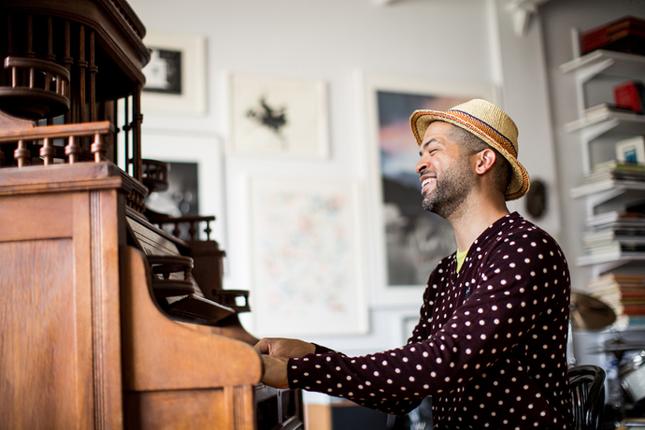Jason — Like Jazz — Takes In from Everywhere
By • October 26, 2015 0 1141

It’s pretty plain to see that Jason Moran, the artistic director for jazz at the Kennedy Center, is quite the explorer, quite the collaborationist, quite the expansionist.
It was pretty evident back in September, when he curated “Finding a Line: Skateboarding, Music and Media,” set in a skate park constructed on the center’s front plaza. The festival kicked off the new “Jason+” series, which features Moran, a virtuoso jazz pianist with his own group, in cross-genre and cross-discipline collaborations.
“It’s a continuing examination, a deeper exploration of what you can do with jazz, how it can be transforming and transformed, both,” Moran said. “We’re talking here about teenaged skaters, a world-renowned classical pianist, a contemporary dance choreographer who stretches the boundaries of his own discipline. It’s kind of a holistic approach to music, and to jazz, because jazz has a global presence, and a global vision.”
Moran comes by his collaborative tendencies naturally. He’s married to mezzo-soprano Alicia Hall Moran. (They have 7-year-old twin sons, Jonas and Malcolm.) “She turned me on to and got me to listen to more atonal kinds of classical music, which was something of a revelation to me, since at the time I was heavily into Duke Ellington, which is more melodic kind of music.”
The most recent example of putting musical genres together was “Jason+Jeremy,” a collaboration (and co-presentation with Washington Performing Arts) in which Moran and classical pianist Jeremy Denk performed as dueling pianists. “Neither one of us knew what the other would play, how it would work out, and so we sort of played with and off of each other. At one point, Jeremy talked about trying out a Charles Ives piece, and that made me think about old Negro spirituals, and in that way, we came back to jazz, to the core music. Jeremy can play just about anything, and that’s sort of what it’s about. No one thing is purely jazz, or purely classical, or purely anything. There are other elements out there, and what we did was to explore that and come up with new things.”
That’s also at the heart of the Jason+ program on Oct. 28-30 with choreographer Ronald K. Brown and his dance ensemble Evidence. Moran and his Bandwagon jazz trio will play on stage at the Eisenhower Theater through the dance pieces “The Subtle One,” “Why You Follow” and “Bellows.”
“We’ve never done that, playing live music with a dance piece,” Moran said. “And they’re different pieces, it all adds something to the piece, and the piece demands something from our music.”
Brown founded Evidence in 1985, which means the company is marking its 30th anniversary. He’s known for creating choreography for jazz legends like pianists Ahmad Jamal and Mary Lou Williams. “His dance creations are rooted in West African, to basic rhythms. They’re infused with that kind of tempo and feeling.”
“The Subtle One” is a dance premiere, commissioned in part by the Kennedy Center, with the music composed by Moran. “Why You Follow” is an exploration of rhythmic Afro-Cuba stylings. “Bellows” is a solo piece taken from the work “One Shot,” the nickname of photographer Charles “Teenie” Harris, who documented the life of a single African American community — that of Pittsburgh — over a 40-year period.
Other Jason+ projects will include: “Jason+Mason,” the Mason being Kennedy Center Composer-In-Residence Mason Bates, a March 5 performance in the Crossroads Club in the center’s atrium; and a collaboration with tenor saxophonist and NEA Jazz Master Charles Lloyd on April 29 in the Terrace Theater.
“I think this sort of approach will bring in new audiences,” Moran said. “At the Kennedy Center, collaborations are like incubators of new forms and genres. Jazz is in many ways the most innovative kind of music — it takes in from everywhere.”

